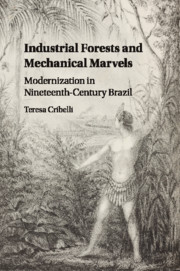Refine search
Actions for selected content:
13588 results in History of science and technology
Styles of Knowledge Production in Colombia, 1850–1920
-
- Journal:
- Science in Context / Volume 29 / Issue 3 / September 2016
- Published online by Cambridge University Press:
- 30 August 2016, pp. 347-377
- Print publication:
- September 2016
-
- Article
- Export citation
SIC volume 29 issue 3 Cover and Back matter
-
- Journal:
- Science in Context / Volume 29 / Issue 3 / September 2016
- Published online by Cambridge University Press:
- 30 August 2016, pp. b1-b5
- Print publication:
- September 2016
-
- Article
-
- You have access
- Export citation
Reflections on the Notion of Culture in the History of Mathematics: The Example of “Geometrical Equations”
-
- Journal:
- Science in Context / Volume 29 / Issue 3 / September 2016
- Published online by Cambridge University Press:
- 30 August 2016, pp. 273-304
- Print publication:
- September 2016
-
- Article
- Export citation
Knowing Their Place: The Blue Hill Observatory and the Value of Local Knowledge in an Era of Synoptic Weather Forecasting, 1884–1894
-
- Journal:
- Science in Context / Volume 29 / Issue 3 / September 2016
- Published online by Cambridge University Press:
- 30 August 2016, pp. 305-346
- Print publication:
- September 2016
-
- Article
- Export citation

Industrial Forests and Mechanical Marvels
- Modernization in Nineteenth-Century Brazil
-
- Published online:
- 05 August 2016
- Print publication:
- 27 July 2016
Bibliography
-
- Book:
- Death in Beijing
- Published online:
- 05 July 2016
- Print publication:
- 28 July 2016, pp 233-250
-
- Chapter
- Export citation
Conclusion: A History of Forensic Modernity
-
- Book:
- Death in Beijing
- Published online:
- 05 July 2016
- Print publication:
- 28 July 2016, pp 216-224
-
- Chapter
- Export citation
Glossary
-
- Book:
- Death in Beijing
- Published online:
- 05 July 2016
- Print publication:
- 28 July 2016, pp 225-232
-
- Chapter
- Export citation
Copyright page
-
- Book:
- Death in Beijing
- Published online:
- 05 July 2016
- Print publication:
- 28 July 2016, pp iv-iv
-
- Chapter
- Export citation
6 - Dissection and Its Discontents
-
- Book:
- Death in Beijing
- Published online:
- 05 July 2016
- Print publication:
- 28 July 2016, pp 160-186
-
- Chapter
- Export citation
3 - Disputed Forensics and Skeletal Remains
-
- Book:
- Death in Beijing
- Published online:
- 05 July 2016
- Print publication:
- 28 July 2016, pp 87-109
-
- Chapter
- Export citation
7 - Legal Medicine during the Nanjing Decade
-
- Book:
- Death in Beijing
- Published online:
- 05 July 2016
- Print publication:
- 28 July 2016, pp 187-215
-
- Chapter
- Export citation
Figures
-
- Book:
- Death in Beijing
- Published online:
- 05 July 2016
- Print publication:
- 28 July 2016, pp vi-vi
-
- Chapter
- Export citation
2 - On the Case with the Beijing Procuracy
-
- Book:
- Death in Beijing
- Published online:
- 05 July 2016
- Print publication:
- 28 July 2016, pp 57-86
-
- Chapter
- Export citation
Index
-
- Book:
- Death in Beijing
- Published online:
- 05 July 2016
- Print publication:
- 28 July 2016, pp 251-258
-
- Chapter
- Export citation
5 - Professional Politics of a Crime Scene
-
- Book:
- Death in Beijing
- Published online:
- 05 July 2016
- Print publication:
- 28 July 2016, pp 136-159
-
- Chapter
- Export citation
1 - Suspicious Deaths and City Life in Republican Beijing
-
- Book:
- Death in Beijing
- Published online:
- 05 July 2016
- Print publication:
- 28 July 2016, pp 25-56
-
- Chapter
- Export citation
4 - Publicity, Professionals, and the Cause of Forensic Reform
-
- Book:
- Death in Beijing
- Published online:
- 05 July 2016
- Print publication:
- 28 July 2016, pp 110-135
-
- Chapter
- Export citation
Contents
-
- Book:
- Death in Beijing
- Published online:
- 05 July 2016
- Print publication:
- 28 July 2016, pp v-v
-
- Chapter
- Export citation
Acknowledgements
-
- Book:
- Death in Beijing
- Published online:
- 05 July 2016
- Print publication:
- 28 July 2016, pp vii-x
-
- Chapter
- Export citation
